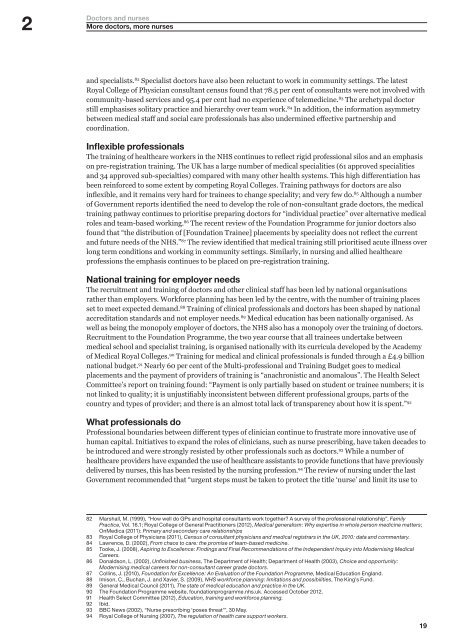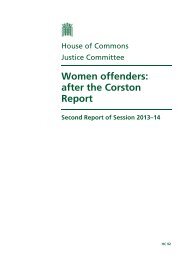Doctors and nurses - Reform
Doctors and nurses - Reform
Doctors and nurses - Reform
You also want an ePaper? Increase the reach of your titles
YUMPU automatically turns print PDFs into web optimized ePapers that Google loves.
2<br />
<strong>Doctors</strong> <strong>and</strong> <strong>nurses</strong><br />
More doctors, more <strong>nurses</strong><br />
<strong>and</strong> specialists. 82 Specialist doctors have also been reluctant to work in community settings. The latest<br />
Royal College of Physician consultant census found that 78.5 per cent of consultants were not involved with<br />
community-based services <strong>and</strong> 95.4 per cent had no experience of telemedicine. 83 The archetypal doctor<br />
still emphasises solitary practice <strong>and</strong> hierarchy over team work. 84 In addition, the information asymmetry<br />
between medical staff <strong>and</strong> social care professionals has also undermined effective partnership <strong>and</strong><br />
coordination.<br />
Inflexible professionals<br />
The training of healthcare workers in the NHS continues to reflect rigid professional silos <strong>and</strong> an emphasis<br />
on pre-registration training. The UK has a large number of medical specialities (61 approved specialities<br />
<strong>and</strong> 34 approved sub-specialties) compared with many other health systems. This high differentiation has<br />
been reinforced to some extent by competing Royal Colleges. Training pathways for doctors are also<br />
inflexible, <strong>and</strong> it remains very hard for trainees to change speciality; <strong>and</strong> very few do. 85 Although a number<br />
of Government reports identified the need to develop the role of non-consultant grade doctors, the medical<br />
training pathway continues to prioritise preparing doctors for “individual practice” over alternative medical<br />
roles <strong>and</strong> team-based working. 86 The recent review of the Foundation Programme for junior doctors also<br />
found that “the distribution of [Foundation Trainee] placements by speciality does not reflect the current<br />
<strong>and</strong> future needs of the NHS.” 87 The review identified that medical training still prioritised acute illness over<br />
long term conditions <strong>and</strong> working in community settings. Similarly, in nursing <strong>and</strong> allied healthcare<br />
professions the emphasis continues to be placed on pre-registration training.<br />
National training for employer needs<br />
The recruitment <strong>and</strong> training of doctors <strong>and</strong> other clinical staff has been led by national organisations<br />
rather than employers. Workforce planning has been led by the centre, with the number of training places<br />
set to meet expected dem<strong>and</strong>. 88 Training of clinical professionals <strong>and</strong> doctors has been shaped by national<br />
accreditation st<strong>and</strong>ards <strong>and</strong> not employer needs. 89 Medical education has been nationally organised. As<br />
well as being the monopoly employer of doctors, the NHS also has a monopoly over the training of doctors.<br />
Recruitment to the Foundation Programme, the two year course that all trainees undertake between<br />
medical school <strong>and</strong> specialist training, is organised nationally with its curricula developed by the Academy<br />
of Medical Royal Colleges. 90 Training for medical <strong>and</strong> clinical professionals is funded through a £4.9 billion<br />
national budget. 91 Nearly 60 per cent of the Multi-professional <strong>and</strong> Training Budget goes to medical<br />
placements <strong>and</strong> the payment of providers of training is “anachronistic <strong>and</strong> anomalous”. The Health Select<br />
Committee’s report on training found: “Payment is only partially based on student or trainee numbers; it is<br />
not linked to quality; it is unjustifiably inconsistent between different professional groups, parts of the<br />
country <strong>and</strong> types of provider; <strong>and</strong> there is an almost total lack of transparency about how it is spent.” 92<br />
What professionals do<br />
Professional boundaries between different types of clinician continue to frustrate more innovative use of<br />
human capital. Initiatives to exp<strong>and</strong> the roles of clinicians, such as nurse prescribing, have taken decades to<br />
be introduced <strong>and</strong> were strongly resisted by other professionals such as doctors. 93 While a number of<br />
healthcare providers have exp<strong>and</strong>ed the use of healthcare assistants to provide functions that have previously<br />
delivered by <strong>nurses</strong>, this has been resisted by the nursing profession. 94 The review of nursing under the last<br />
Government recommended that “urgent steps must be taken to protect the title ‘nurse’ <strong>and</strong> limit its use to<br />
82 Marshall, M. (1999), “How well do GPs <strong>and</strong> hospital consultants work together? A survey of the professional relationship”, Family<br />
Practice, Vol. 16.1; Royal College of General Practitioners (2012), Medical generalism: Why expertise in whole person medicine matters;<br />
OnMedica (2011): Primary <strong>and</strong> secondary care relationships<br />
83 Royal College of Physicians (2011), Census of consultant physicians <strong>and</strong> medical registrars in the UK, 2010: data <strong>and</strong> commentary.<br />
84 Lawrence, D. (2002), From chaos to care: the promise of team-based medicine.<br />
85 Tooke, J. (2008), Aspiring to Excellence: Findings <strong>and</strong> Final Recommendations of the Independent Inquiry into Modernising Medical<br />
Careers.<br />
86 Donaldson, L. (2002), Unfinished business, The Department of Health; Department of Health (2003), Choice <strong>and</strong> opportunity:<br />
Modernising medical careers for non-consultant career grade doctors.<br />
87 Collins, J. (2010), Foundation for Excellence: An Evaluation of the Foundation Programme, Medical Education Engl<strong>and</strong>.<br />
88 Imison, C., Buchan, J. <strong>and</strong> Xavier, S. (2009), NHS workforce planning: limitations <strong>and</strong> possibilities, The King’s Fund.<br />
89 General Medical Council (2011), The state of medical education <strong>and</strong> practice in the UK.<br />
90 The Foundation Programme website, foundationprogramme.nhs.uk. Accessed October 2012.<br />
91 Health Select Committee (2012), Education, training <strong>and</strong> workforce planning.<br />
92 Ibid.<br />
93 BBC News (2002), “Nurse prescribing ‘poses threat’”, 30 May.<br />
94 Royal College of Nursing (2007), The regulation of health care support workers.<br />
19

















